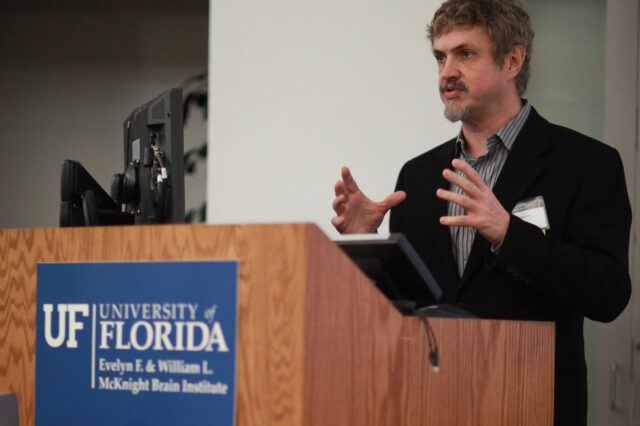Teaching an old brain new tricks: The aging brain works differently to make up for lost function

Neuroscientist Roberto Cabeza, Ph.D., a professor with the Duke Institute for Brain Sciences, gave the keynote address Feb. 29 at the University of Florida McKnight Brain Institute symposium on aging, memory and cognitive decline. (Photo by Jesse Jones/University of Florida)
For some, successful aging means looking and acting like the young. But not when it comes to the brain.
Imaging and molecular studies show that even when older adults perform at a high level, their brains often don’t do things in the same way as young people’s brains. In fact, it’s low-performing older adults whose brain activity often looks like that of younger folks. Older brains have a way of making up for age-related losses in function by working in different ways and recruiting new brain areas and paths to help get things done.
The findings suggest a different picture from the idea of aging simply as inexorable decline. Understanding how older brains compensate for losses could lead to new methods for detecting cognitive decline early and therapies for boosting brain activity.
“The brain is a very complex machine. It can go wrong in many different ways, but it can also improve productivity in many different ways,” said neuroscientist Roberto Cabeza, Ph.D., a Duke University professor who gave the keynote address Feb. 29 at the UF McKnight Brain Institute symposium on aging, memory and cognitive decline.
The symposium, sponsored by the McKnight Brain Research Foundation, featured multidisciplinary presentations from scientists in the departments of neuroscience, aging and geriatric research, bioengineering and clinical health psychology. Topics ranged from molecular mechanisms to human clinical trials. Ronald Cohen, M.D., the newly appointed director of UF’s Cognitive Aging and Memory Clinical Translational Research Program, spoke on the influence of cardiovascular disease and body weight changes on cognitive decline.
Cabeza’s research showed that the brains of older adults can compensate for losses by making adjustments in terms of space, time or connectivity between regions.
The compensation is often in the form of increased activity, which shows up on functional magnetic resonance imaging studies as increased blood flow to a particular area. Such “overactivation” could be helpful, harmful or of no effect. Whereas young people might have activity in just one hemisphere of the brain when completing a certain type of task, older adults’ brains often show activity in both hemispheres.
Older brains might compensate timewise by becoming more activated during the later stages of a task rather than near the beginning. Cabeza likened this to spending more effort to inspect and discard faulty units at the end of a production line, instead of using more energy and effort near the beginning of the process to make sure that very few, if any, faulty products are made in the first place.
The brain also compensates by downplaying processes that are more demanding and instead using alternative pathways that are less taxing.
It’s not just high-functioning older adults who benefit from the brain’s ability to make compensations. Researchers have traditionally thought that the type of brain overactivation seen in low-performing older adults is detrimental. But there is evidence that this is not necessarily the case. Even in people who have low cognitive function, the extra brainwork is sometimes linked to improved performance.
“This compensation may be a sign of fundamental problems that need to be recognized and treated, but it also represents the amazing ability of the brain to adapt to the stresses of life,” said Thomas Foster, Ph.D., the Evelyn F. McKnight chair for brain research in memory loss at UF, who organized the symposium. “Age-related cognitive decline and memory impairment can rob us of our independence and sense of self, and this is a concern for an increasing portion of the population as we grow older. This is why national efforts are put forth to develop techniques for early detection and expanded research on understanding the causes and treatment.”
Learning about the many ways in which aging affects the brain and how the brain handles those changes can help researchers find ways to improve brain function in older adults, Cabeza said. The knowledge could be used, for example, in creating behavioral or drug therapies that can train older brains to change how they do their work.
“This idea is very provocative,” said McKnight trustee J. Lee Dockery, M.D., former interim and executive associate dean at the UF College of Medicine. “But the challenge for us is how to translate this knowledge into treatment of the human condition.”